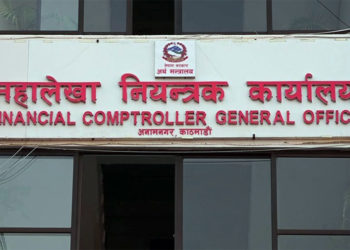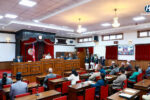KATHMANDU: Economic Digest offers a concise yet comprehensive overview of significant business happenings in Nepal, presented in easily digestible summaries.
Nepal’s economic landscape is experiencing mixed developments, with NEPSE rebounding after a six-day losing streak, SEBON revising underwriting limits for merchant banks, and real estate developers forming an Urban Development Company to boost housing projects.
While the stock market saw gains, gold prices declined, and lawmakers called for VAT removal on airfare to support tourism.
Meanwhile, Nepal’s success in reducing extreme poverty contrasts with structural economic challenges, requiring policy reforms to sustain growth.
The government is tightening banking laws to address rising financial crimes, while cybersecurity experts recommend strengthening digital governance. Infrastructure projects, including full-capacity operation at Kulekhani Hydropower and increased petroleum imports, indicate growing energy demand.
Additionally, the aviation sector is set for expansion with Nepal Airlines’ plans to lease aircraft, and studies highlight Nepal’s potential in hemp cultivation.
However, challenges persist, such as the devastating fire in Dang’s plywood industry and restrictive policies hindering economic opportunities.
NEPSE recovers by 26.10 points
After six consecutive days of losses, the Nepal Stock Exchange (NEPSE) rebounded by 26.10 points (0.99%), closing at 2,640.78. The index fluctuated between 2,645.99 and 2,592.32, with a total trading volume of Rs. 4.48 billion across 58,235 transactions involving 326 companies.
Guardian Micro Life Insurance (GMLI) led the gainers with a 9.51% rise, while Upper Hewakhola Hydropower (UHEWA) saw the largest drop at 4.26%.
The Finance Index recorded the highest sectoral gain at 3.52%, followed by a 0.44% increase in the Mutual Fund Index. Shivam Cements led in turnover, with trades worth Rs. 32.69 Crores, closing at Rs. 966.60.
Gold prices drop by Rs. 600 per tola
The price of hallmark gold in Nepal has decreased by Rs. 600 per tola, settling at Rs. 173,500, down from Rs. 174,100 on Sunday, according to the Federation of Nepal Gold and Silver Dealers’ Association. Meanwhile, silver prices remain unchanged at Rs. 1,980 per tola.
SEBON revises underwriting limit for merchant banks
The Securities Board of Nepal (SEBON) has revised underwriting limits for merchant banks affiliated with banks and insurance companies. These institutions can now underwrite securities up to their net worth, provided their parent banks or insurers offer liability guarantees.
Previously, the limit was three times their net worth, but this was not officially codified in the Merchant Banker Regulations. SEBON spokesperson Niranjaya Ghimire confirmed that the regulations will soon be amended to reflect this change, expanding the underwriting capacity of these institutions.
MERO and SARBTM bonus shares listed on NEPSE
Mero Microfinance Laghubitta Bittiya Sanstha Ltd. (MERO) has listed 9,90,000 unit bonus shares on NEPSE after approving a 7.8947% dividend for FY 2080/81.
This includes a 7.5% bonus share worth Rs. 9.90 crores and a 0.3947% cash dividend of Rs. 52.10 lakhs. MERO’s latest trading price (LTP) stands at Rs. 717.92. Similarly, Sarbottam Cement Limited (SARBTM) has listed 32,55,000 unit bonus shares after approving a 10% dividend, comprising 7% bonus shares worth Rs. 32.55 crores and a 3% cash dividend worth Rs. 13.95 crores. SARBTM’s LTP is Rs. 783.82.
Lawmakers push for removal of VAT on airfare
Members of Parliament have called on the government to eliminate VAT on airfare, arguing that high ticket prices drive Nepalese travelers to opt for foreign airlines.
In a parliamentary committee meeting, MP Udaya Shumsher Rana emphasized that expensive airfare negatively impacts tourism. Meanwhile, MP Prem Suwal criticized customs agents’ monopoly at airports. Lawmakers also pressed for improvements to Janakpur Airport and increased capital expenditure in the aviation sector.
Banking offenses dominate crime statistics
Banking offenses made up 25.22% of all crimes registered in Nepal last month, with 1,127 out of 4,468 cases involving financial fraud, primarily cheque bounces.
The highest crime rates were reported in the Kathmandu Valley, which also saw a rise in cyber-related offenses, according to Nepal Police. In response, the government revised the Banking Offenses Act, 2064, in February, introducing stricter penalties to improve financial security and restore public trust in banking institutions.
Nepal achieves remarkable poverty reduction: World Bank
The World Bank’s Nepal Country Economic Memorandum highlights Nepal’s significant success in nearly eradicating extreme poverty over the past three decades, outpacing comparable nations.
This achievement is primarily attributed to migration and remittances, with over 7% of Nepal’s population working abroad by 2023. However, structural issues, weak exports, and slow hydropower development are hampering economic growth.
The World Bank urges policy reforms to enhance investment, exports, and digitalization, warning that without action, Nepal’s long-term growth could remain below 4%. The government has reaffirmed its commitment to economic reforms under its 16th Development Plan.
Kulekhani Hydropower Project reaches full capacity
All three units of the Kulekhani Hydropower Project in Makawanpur are now operating at full capacity as the dry season begins. Kulekhani I generates 60 MW, Kulekhani II produces 32 MW, and Kulekhani III generates 14 MW, according to project chief Taradatta Bhatta.
The run-of-river project supplies electricity for 14 to 16 hours daily and has the potential for 24-hour generation based on demand. In the first eight months of this fiscal year, Kulekhani I generated 81,209 MWh, more than doubling last year’s 34,388 MWh during the same period.
Massive fire destroys Sangrila Plywood Industry in Dang
A devastating fire has engulfed Sangrila Plywood Industry in Ghorahi-9, Dang, for over 18 hours, with authorities struggling to contain it due to flammable materials inside the facility.
Eight fire trucks and 200 security personnel have been deployed. The fire has completely destroyed the six-bigha factory, making it the largest industrial fire in Dang’s history.
While nearby settlements were protected, the total extent of the damage is yet to be determined.
Experts call for cyber–security enhancements in Nepal’s e-Governance Blueprint 2081
Cybersecurity experts from NPCERT and CSRI Nepal have recommended significant improvements to Nepal’s E-Governance Blueprint 2081, emphasizing stronger digital security measures.
NPCERT proposed establishing a centralized oversight body, a national data center, a cybersecurity hub, and stricter data protection laws. CSRI Nepal highlighted the need for ethical digital services, rural internet expansion, AI and blockchain security, and updated cyber laws to align with global standards.
These reforms aim to improve trust, efficiency, and coordination in Nepal’s digital governance.
Nepal Airlines plans to lease aircraft for int’l expansion
Tourism Minister Badri Prasad Pandey has announced plans to lease aircraft to expand Nepal Airlines’ international operations. Speaking at a parliamentary committee meeting, he stressed the urgent need for 10 wide-body and 10 narrow-body aircraft to meet rising passenger demand.
The government is in the final stages of discussions and is formulating a new aviation policy to tackle industry challenges, including ticket pricing issues.
Study identifies 1.8 million hectares suitable for hemp farming
A study published in the Renewable & Sustainable Energy Reviews has identified 1.8 million hectares of land in Nepal as suitable for hemp cultivation, with 280,000 hectares classified as optimal. The study highlights hemp’s economic and environmental benefits, estimating potential profits of $7,273 per hectare.
However, Nepal’s restrictive laws remain a significant barrier, despite global legalization trends. Experts are urging policy reforms to tap into hemp’s potential for sustainability, biofuel production, and industrial applications.
Real estate developers establish Urban Development Company for joint investments
Nepal’s real estate developers have formed an Urban Development Company to jointly invest in large-scale housing projects, aiming to revitalize the sector.
The initiative, backed by the Nepal Land and Housing Developers’ Federation, has already raised Rs. 100 million and seeks foreign investments from South Korea and Dubai.
Developers cite restrictive banking policies and government regulations as key obstacles and warn that forced property auctions could occur if reforms are not implemented.
The company plans to develop housing projects and townships, addressing the capital limitations faced by individual firms.
Petroleum imports via Birgunj reach Rs. 122.2 billion in eight months
Nepal’s petroleum imports through the Birgunj border have reached Rs. 122.2 billion in the first eight months of the 2024/25 fiscal year, reflecting an increase of Rs. 1.67 billion compared to the same period last year.
The imports include diesel, petrol, LPG, aviation turbine fuel, and kerosene. Revenue from petroleum imports has also risen to Rs. 50.13 billion, up from Rs. 44.80 billion.
According to the Birgunj Customs Office, diesel imports amounted to 685,991 kiloliters, petrol to 290,382 kiloliters, and LPG to 210 million kg. Officials attribute the rise in imports to growing infrastructure projects.









Comment